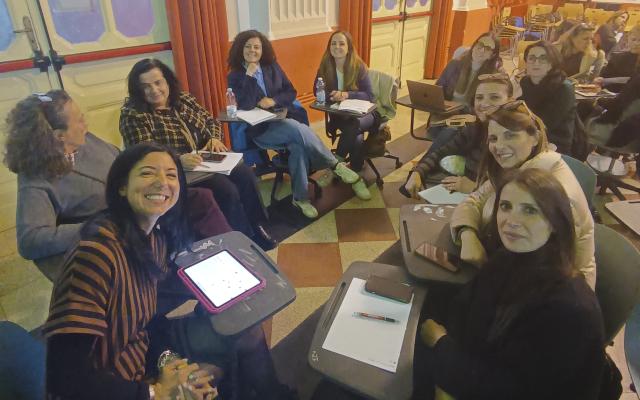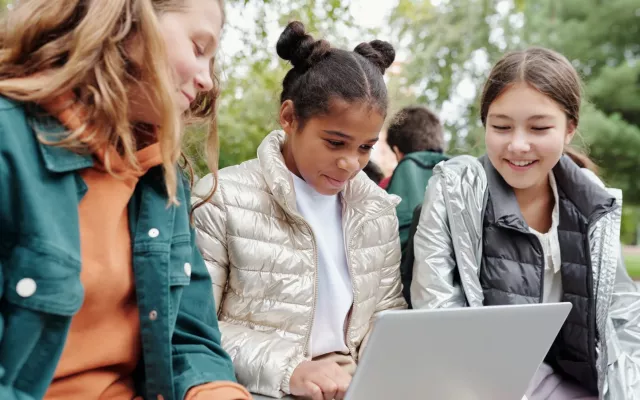A conversation with Roberto Raspa, the trainer who pushes teachers beyond their comfort zone
Teachers' still fragile digital skills are one of the biggest barriers preventing many female students from pursuing STEM careers. This is highlighted by the Breaking Barriers research conducted by Google with Canvas8 in 2023. To address this challenge, the Fondazione Mondo Digitale ETS has launched a training course for teachers as part of the Breaking Barriers project. During the summer, four thematic webinars - open data, geocoding, augmented reality and online safety - offered practical tools to bring more engaging and real-world methodologies into the classroom, thanks in part to the field experience of trainer and engineer Roberto Raspa, an expert in laboratory teaching and educational robotics. He is a cross-disciplinary figure who knows how to bridge the gap between the needs of schools and the ever-changing demands of the labour market.
According to Raspa, the barrier often encountered by teachers can be traced back to a lack of confidence with computer language. 'Sometimes the view of IT is limiting. When teachers are not comfortable with a new methodology, they tend to follow established guidelines without leaving their comfort zone. Constantly putting yourself out there is difficult and requires constant updating. It takes a little curiosity and a desire to experiment, to fight the awe of technology. Instead, discovering new tools together with your students enriches the learning experience and does not undermine the role of the teacher."
When describing the training proposals, Raspa points out that the course is divided into two main categories. ‘First of all, we resumed coding and programming with Scratch, to enable all teachers, regardless of their subject, to use a tool suitable for students of any age and for any topic. Secondly, we addressed computer science topics.’
"With regard to Scratch, we identified a couple of activities to do together, starting with the CS First platform. By playing with animations, we talked about places around the world and customs (5 June, “Geocoding, when geography becomes a game”). In the webinar, we set up animated projects and then let the teachers continue on their own. After geography, in the second meeting, we tried to think about the themes of the 2030 agenda, creating an animation related to recycling."
‘In two meetings, we introduced the basic units, binary code and some simple games, but also cryptography, both in terms of its origins and the most up-to-date tools with their respective fields of application (’The magic of bits, analogue, digital and codes‘, 7 February, and ’Secret stories... how cryptography entered our daily lives", 14 February).
When the topics become more specialised, there is often a need for greater clarity: “We added two meetings, one on AI and machine learning (24 March) to explain what this technology is and how it came about, and the other on VPNs, the dark web and the deep web ('The dark side of the Internet”, 17 July). In this second meeting, we talked about the Internet in all its forms, discovering how little real knowledge there is about these sensitive issues. We showed some simulated dark web environments to demonstrate the risks associated with its use, including aspects of safe browsing. The aim was to help teachers support young people in their browsing habits. For example, few people knew that students use VPNs to avoid paying for content, but their personal data is sold for marketing purposes.
Another meeting organised with Piersoft (Francesco Piero Paolicelli) focused on open data on 2 July. Paolicelli provided examples of databases that he himself helped develop on national organisations. Raspa, on the other hand, referred to more educational examples related to the school context, in particular how data is collected at school and how it is analysed.
The last meeting focused on virtual reality (8 July): ‘I wanted to highlight the aspect related to the work of digital twins and the many virtuous possibilities linked to their use, such as, in medicine, the reconstruction of a patient's virtual organs in order to try out surgery in an immersive way. In teaching, I showed examples related to science (animals, the water cycle) and history (the Colosseum).’.
The approach chosen for each meeting was always very practical: “We first showed how to create projects with Scratch, then moved on to the various platforms and answered the teachers” questions in a chat'. 'The teachers were extremely responsive and showed a great desire to share and pool their experiences. After the training, I had the distinct feeling that they will want to rework and experiment on their own, understand and reinterpret the meaning of the experience they have just had for their particular reality. If this independent work comes to fruition, the value of the project for everyday teaching will be truly significant: acquiring the ability to read data properly means building one's own vision independently and mastering information. Not only that, but using open data as a source allows you to create subsequent applications, such as an app or a service. Many start-ups today have been created thanks to open data. There are also many IT service applications: think of virtual reality, which allows you to bring a three-dimensional object to life by familiarising yourself with elements that you will find in the world of work. Today, a mechanic must be able to test a three-dimensionally reconstructed engine, just as a surgeon must be able to prepare for an operation in the best possible way, including through the use of technology. There is no shortage of applications in history and art: just think of the experiences that allow us to approach certain concepts and eras through immersive reality.




